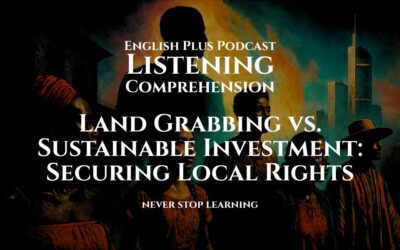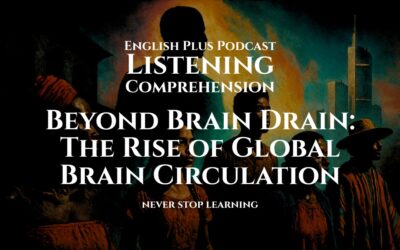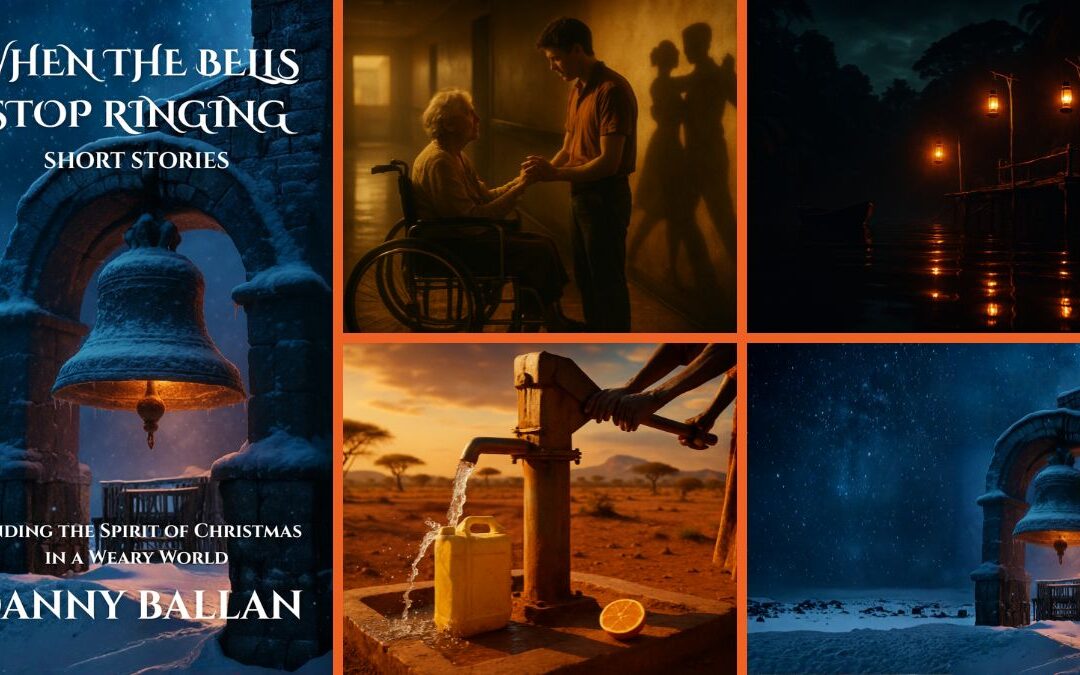Listen | Renewable Energy Sources
Listening Comprehension Quiz
Transcript: Please don’t check the transcript before you listen and take the quiz.
Good afternoon, everyone. Today, we’re going to explore a fascinating and increasingly important topic: renewable energy sources. Now, I’m sure many of you have heard the term “renewable energy” thrown around, but have you ever stopped to think about what it actually means? Renewable energy refers to power generated from sources that naturally replenish themselves over time. These are resources we can count on for the long haul, unlike fossil fuels, which will eventually run out and are harmful to the environment.
Imagine a world where we rely solely on energy that doesn’t pollute the air or contribute to climate change. That’s what renewable energy promises. But let’s break it down. When we talk about renewable energy, we’re typically referring to five main types: solar, wind, hydro, geothermal, and biomass. Each of these energy sources works in a unique way to provide power, and all of them come with their own benefits and challenges.
Let’s start with solar energy. Have you ever stood outside on a sunny day and just felt the sheer power of the sun? That’s solar energy in its rawest form. By capturing the sun’s light and converting it into electricity using solar panels, we can power homes, schools, and even entire cities. And the great thing about the sun? It’s not going anywhere anytime soon! However, solar energy does have its challenges—what happens when it’s cloudy or at night? Storage technology is still developing to solve this issue, but it’s coming along nicely.
Next up, wind energy. Picture a giant wind turbine spinning on a hilltop. What you’re seeing is wind energy in action. The wind turns the blades of the turbine, which generates electricity. It’s a pretty cool process when you think about it—using something as natural and free as the wind to power our lives. Wind energy is especially popular in coastal areas and open plains where strong winds are frequent. But, just like solar, wind energy isn’t always consistent. If the wind doesn’t blow, we don’t generate power. So, it’s important to combine wind energy with other renewable sources to keep everything running smoothly.
Now, let’s talk about hydroelectric power, or simply, hydropower. This one’s been around for a long time and is still one of the most reliable sources of renewable energy. If you’ve ever visited a dam, you’ve seen hydropower in action. Water flows through turbines, generating electricity as it moves. It’s a brilliant use of a resource that’s constantly moving and replenishing itself. The downside? Building dams can disrupt ecosystems and displace communities, so we have to be careful with where and how we implement hydropower projects.
Geothermal energy is next on our list, and it’s probably one of the least talked about but most interesting sources. Beneath the Earth’s surface, there’s an immense amount of heat. By tapping into that heat, we can generate electricity and even heat our homes directly. Countries like Iceland use geothermal energy for a large part of their power needs because they’re lucky enough to have lots of volcanic activity. However, it’s not something every country can easily access, which limits its use globally.
Finally, we have biomass energy, which might sound a bit complicated but is actually pretty straightforward. Biomass energy comes from organic materials—think of plant waste, wood, and even garbage. When these materials are burned or processed, they release energy that can be captured and used. It’s like recycling nature’s leftovers into power! But, while biomass is renewable, it’s not always clean. Burning organic material releases carbon dioxide, which means it has to be done carefully to avoid contributing to global warming.
So, why are we pushing for renewable energy in the first place? Well, traditional energy sources like coal, oil, and natural gas are not only limited but also harmful to our planet. They release huge amounts of carbon dioxide and other pollutants that lead to climate change, air pollution, and a whole host of environmental problems. By switching to renewable energy, we reduce our reliance on fossil fuels and help create a cleaner, more sustainable future.
Renewable energy is growing rapidly, and it’s exciting to think about what the future holds. With advancements in technology, the cost of renewable energy is coming down, making it more accessible than ever before. And the best part? These sources are abundant. The sun, wind, and water will always be there. The challenge now is to continue developing the technology to harness them more efficiently and make sure that we’re using them in a way that benefits both people and the planet.
In conclusion, renewable energy offers a glimpse of a future where our power doesn’t come at the expense of the environment. Whether it’s the warmth of the sun, the power of the wind, the flow of rivers, the heat of the Earth, or even waste products, renewable energy shows us that sustainable power is possible. And that’s not just good for the planet—that’s good for all of us.
Expand Your Vocabulary
- Replenish
Meaning: To fill something up again or restore it to its original state.
Context: In the article, renewable energy sources are described as those that “naturally replenish themselves.” This means that resources like sunlight, wind, and water are constantly available and can be used without running out.
Everyday Use: You might replenish your water bottle after finishing a workout or replenish a stock of supplies when they run low. - Fossil Fuels
Meaning: Natural fuels such as coal, oil, or gas that are formed in the earth from the remains of living organisms over millions of years.
Context: Fossil fuels are contrasted with renewable energy sources because they take millions of years to form and are not sustainable in the long term.
Everyday Use: We often hear about fossil fuels in discussions about climate change or energy consumption. People are encouraged to reduce their reliance on fossil fuels by using cleaner alternatives. - Sustainable
Meaning: Able to be maintained or continued without depleting resources or harming the environment.
Context: Renewable energy is referred to as sustainable because it doesn’t deplete natural resources.
Everyday Use: You might hear this word in discussions about lifestyle choices, such as “sustainable farming” or “sustainable fashion,” where the goal is to protect resources for future generations. - Harness
Meaning: To control and make use of a resource to produce power or achieve something.
Context: The article talks about “harnessing” energy from the sun or wind. This means converting the power of natural elements into something useful, like electricity.
Everyday Use: You can harness your skills or energy to achieve your personal goals or take advantage of an opportunity. - Turbine
Meaning: A machine that produces continuous power by rotating blades or wheels driven by the flow of water, steam, air, or another fluid.
Context: In wind and hydropower systems, turbines are used to generate electricity by turning mechanical energy into electrical energy.
Everyday Use: Turbines are commonly seen in wind farms, but you might also hear the term when discussing power plants or airplane engines. - Biomass
Meaning: Organic material, such as plant or animal waste, that can be used as fuel to produce energy.
Context: Biomass energy comes from burning or processing organic materials to generate electricity.
Everyday Use: You might hear about biomass when discussing renewable energy sources or ways to recycle organic waste. - Carbon Dioxide
Meaning: A colorless, odorless gas that is produced by burning carbon-based fuels and by respiration. It is a major greenhouse gas that contributes to global warming.
Context: The article mentions that burning biomass releases carbon dioxide, which contributes to global warming.
Everyday Use: You often hear about carbon dioxide in discussions about climate change and emissions, such as reducing “carbon footprints” to combat global warming. - Volcanic Activity
Meaning: The processes associated with the movement of molten rock, gases, and other materials beneath the Earth’s surface, which can lead to eruptions and geothermal energy.
Context: Geothermal energy is tapped from heat produced by volcanic activity, particularly in places like Iceland.
Everyday Use: You might encounter this term when discussing natural disasters like volcanic eruptions or when studying geology. - Pollutants
Meaning: Substances that make air, water, or land dirty and unsafe, especially chemicals or waste products.
Context: Traditional energy sources release pollutants, such as carbon dioxide and other harmful gases, which contribute to climate change.
Everyday Use: People often talk about pollutants when discussing environmental issues, such as air pollution, water contamination, or the impact of industrial waste. - Ecosystem
Meaning: A biological community of interacting organisms and their physical environment.
Context: The article discusses how hydropower can disrupt ecosystems, meaning that building dams can interfere with natural habitats.
Everyday Use: You might hear about ecosystems in the context of wildlife conservation, where preserving an ecosystem means maintaining the balance of species and their habitats.
Vocabulary Quiz
Let’s Talk
- Renewable energy sources are often described as the future of power generation. What do you think are the biggest challenges we face in switching completely to renewable energy? Is it technology, cost, or perhaps public awareness?
- Solar and wind energy are popular renewable sources, but they depend heavily on weather conditions. How do you think we can overcome the issue of inconsistency with these energy sources? Are there any innovative solutions you’ve heard about?
- Hydropower is a reliable source of energy but can sometimes harm local ecosystems. How do you think we can balance the need for renewable energy with environmental conservation? Are there ways to develop energy sources without disrupting nature?
- Biomass energy uses organic materials to produce electricity but can still release carbon dioxide. How important do you think it is to reduce all carbon emissions, even from renewable sources like biomass? Should we focus on cleaner alternatives?
- Geothermal energy is an exciting resource, but it’s not available everywhere. Do you think it’s fair to rely on sources like geothermal when only certain regions can benefit from them? How can we make renewable energy more accessible worldwide?
- What role do you think governments should play in promoting renewable energy? Should there be more investment in renewable infrastructure, or do you think it’s more important to focus on public education and awareness first?
- The article mentions that renewable energy technology is advancing rapidly, making it more affordable. What innovations in renewable energy have you heard about, and how do you think they might change the way we use energy in the future?
- Fossil fuels are still widely used despite their harmful effects on the environment. What do you think is stopping countries from moving away from fossil fuels and fully adopting renewable energy?
- Do you think individual actions—such as using solar panels at home or driving electric cars—make a significant difference in reducing our reliance on fossil fuels? Why or why not?
- Climate change is a major driver of the shift toward renewable energy. In your opinion, how can we get more people to understand the urgency of transitioning to cleaner energy sources? What can individuals, communities, or governments do to speed up this transition?










0 Comments